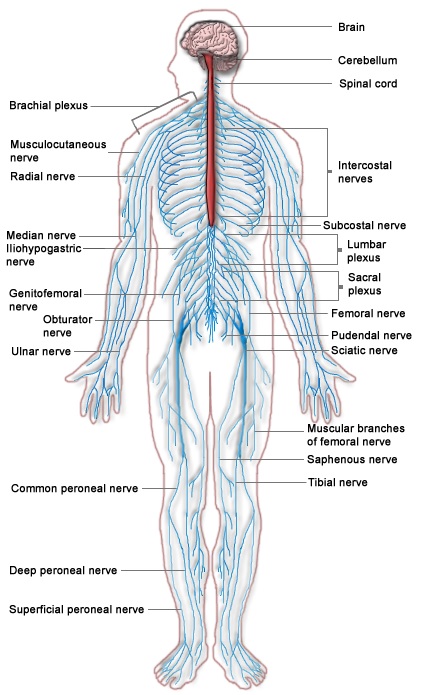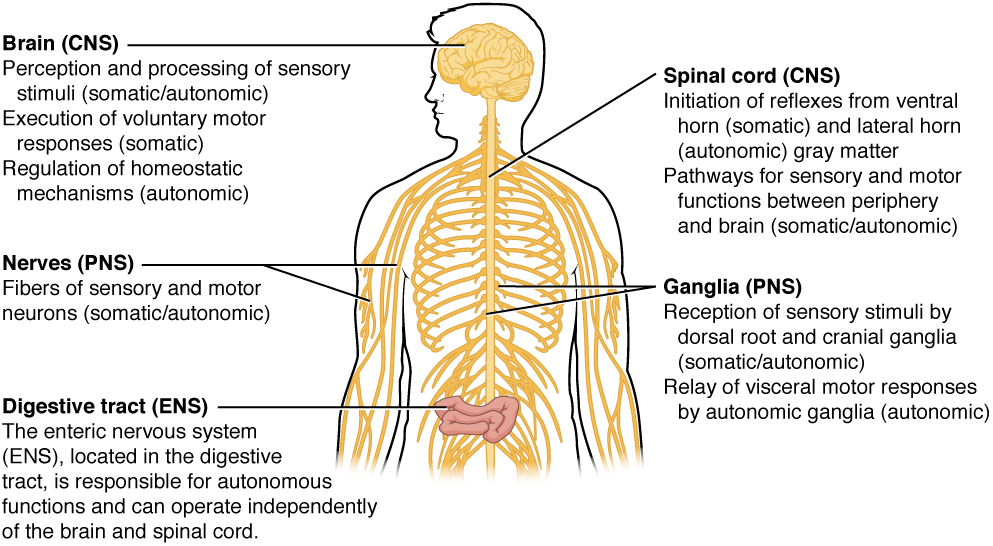- The nervous system consists of the central nervous system (including the brain and spinal cord), the peripheral nervous system and the sensory system including the eyes, ears, nose and tongue. Its prime function is to comminate responses between internal and external stimuli. The names for the herbal combinations are chosen based on the properties of the key herbs i the formula.
- Overview of the nervous system is the highly complex part of an animal that coordinates its actions and sensory information by transmitting signals to and from different parts of its body. The nervous system detects environmental changes that impact the body, then works in tandem with the endocrine system to respond to such events. The autonomic nervous system is further subdivided into the sympathetic and the parasympathetic nervous systems. The sympathetic nervous system is activated in cases of emergencies to mobilize energy, while the parasympathetic nervous system is activated when organisms are in a relaxed state. The enteric nervous system functions to control the gastrointestinal system. Both autonomic and enteric nervous systems function involuntarily. Nerves that exit from the cranium are called cranial nerves while those exiting from the spinal cord are called spinal nerves.
The nervous system consists of the central nervous system (including the brain and spinal cord), the peripheral nervous system and the sensory system including the eyes, ears, nose and tongue. Its prime function is to comminate responses between internal and external stimuli. The names for the herbal combinations are chosen based on the properties of the key herbs i the formula. #
The nervous system includes the central nervous system (CNS) and peripheral nervous system (PNS). The CNS is made up of the brain and spinal cord, whereas the PNS is made up of the somatic and autonomic nervous systems.
Nervous systems are found in most multicellular animals, but vary greatly in complexity.[2] The only multicellular animals that have no nervous system at all are sponges, placozoans, and mesozoans, which have very simple body plans. The nervous systems of the radially symmetric organisms ctenophores (comb jellies) and cnidarians (which include anemones, hydras, corals and jellyfish) consist of a diffuse nerve net. All other animal species, with the exception of a few types of worm, have a nervous system containing a brain, a central cord (or two cords running in parallel), and nerves radiating from the brain and central cord. The size of the nervous system ranges from a few hundred cells in the simplest worms, to around 300 billion cells in African elephants.[3]
The central nervous system functions to send signals from one cell to others, or from one part of the body to others and to receive feedback. Malfunction of the nervous system can occur as a result of genetic defects, physical damage due to trauma or toxicity, infection, or simply senesence. The medical specialty of neurology studies disorders of the nervous system and looks for interventions that can prevent or treat them. In the peripheral nervous system, the most common problem is the failure of nerve conduction, which can be due to different causes including diabetic neuropathy and demyelinating disorders such as multiple sclerosis and amyotrophic lateral sclerosis. Neuroscience is the field of science that focuses on the study of the nervous system.
Function: At the most basic level, the function of the nervous system is to send signals from one cell to others, or from one part of the body to others. There are multiple ways that a cell can send signals to other cells. One is by releasing chemicals called hormones into the internal circulation, so that they can diffuse to distant sites. In contrast to this “broadcast” mode of signaling, the nervous system provides “point-to-point” signals—neurons project their axons to specific target areas and make synaptic connections with specific target cells.[35] Thus, neural signaling is capable of a much higher level of specificity than hormonal signaling. It is also much faster: the fastest nerve signals travel at speeds that exceed 100 meters per second.
At a more integrative level, the primary function of the nervous system is to control the body. It does this by extracting information from the environment using sensory receptors, sending signals that encode this information into the central nervous system, processing the information to determine an appropriate response, and sending output signals to muscles or glands to activate the response. The evolution of a complex nervous system has made it possible for various animal species to have advanced perception abilities such as vision, complex social interactions, rapid coordination of organ systems, and integrated processing of concurrent signals. In humans, the sophistication of the nervous system makes it possible to have language, abstract representation of concepts, transmission of culture, and many other features of human society that would not exist without the human brain.
Therapies for Relieving Excess Conditions: Insomnia is typical of an excess condition of the nervous system. It is often accompanied by anxiety, restlessness and weakness in the sexual organs. Herbalists use aromatic herbs and astringent herbs to calm the mind and the heart.
Excess conditions in the nervous system are marked by patterns of minor aches, pains and ailments including: anxiety, restlessness, fidgeting, muscle spasms, failing memory, neurosis, excitability, nightmares, emotional instability, rapid speech, abnormal laughing, angina pains, inflammatory skin conditions, red eyes, hypertension, heart palpitations, frequent urination and dizziness. If left unchecked, these ailments may develop into illnesses including: epilepsy, stroke, insomnia, heart disease, autism, carpal tunnel syndrome glaucoma, migraine headaches, hyperkinesis, pains, neuralgia and neuropathy, tinnitus, vertigo and schizophrenia.
Therapies for Supplementing Deficient Conditions: Weakness in the nervous system is characterized by a lack of energy and a sense of tension. This often results in headaches and various degrees of depression.
Weakness conditions of the nervous system are often associated with patterns of minor aches, pains and ailments including: hypochondria, fatigue, vertigo, neurosis, hysteria, nightmares, worry, migrating pains, menstrual pains, backaches, abdominal pains, chronic respiratory infections, insomnia, angina pains, chronic coughs, fright, edema and chronic sore throats. If left unchecked, these ailments may develop into the following illnesses: depression, insomnia, premenstrual syndrome, allergies, bronchitis, asthma, colds and influenza.
Overview of the nervous system is the highly complex part of an animal that coordinates its actions and sensory information by transmitting signals to and from different parts of its body. The nervous system detects environmental changes that impact the body, then works in tandem with the endocrine system to respond to such events. The autonomic nervous system is further subdivided into the sympathetic and the parasympathetic nervous systems. The sympathetic nervous system is activated in cases of emergencies to mobilize energy, while the parasympathetic nervous system is activated when organisms are in a relaxed state. The enteric nervous system functions to control the gastrointestinal system. Both autonomic and enteric nervous systems function involuntarily. Nerves that exit from the cranium are called cranial nerves while those exiting from the spinal cord are called spinal nerves. #


—References— “Advanced Treatise in Herbology” by – Edward E. Shook, N.D., D.C. Copyright by Wendell W. Whitman 302 E. Winona Avenue, Warsaw, IN 46580.
—References— Business Dictionare.com http://www.businessdictionary.com/definition/anaerobic.html
—References— “Dicitionary.com” http://www.dictionary.com
—References— “From the Shepherd’s Purse” by – Max G. Barlow, Copyright 1990, ISBN 0-9602812-0-7.
—References— “Healing Herbal Teas” A Complete Guide to Making Delicious, Healthful Beverages. By – Brigitte Mars, A.H.G. ISBN – 13: 978-59120-110-6 and ISBN – 10: 1-59120-110-1 Copyright 2006
—References— “Herbal Medicine” The Natural Way to Get Well and Stay Well; By Dian Dincin Buchman, Ph. D ISBN – 0-517-147647-x; Copyright 1996
—References— Medicine Net.com http://www.medterms.com
—References— Medical Herbalism The Science and practice of herbal medicine by David Hoffman, FNIMH, AHG, Copyright 2003, ISBN – 0-89281-749-6
—References— “Nutritional Herbology” A Reference Guide to Herbs By – Mark Pedersen ISBN: 1-885653-07-7 Copyright 2008
—References— Planetary Herbology by – Michael Tierra, C.A., N.D., Copyright 1988, ISBN – 0-941524-27-2
—References— “Prescription for Nutrition Healing” by – Phyllis A. Balch, CNC, Copyright 2006, ISBN: 1-58333-236-7.
—References— “The Healing Herbs – The Ultimate Guide to the Curative Power of Nature’s Medicines” by – Michael Castleman; Copyright 1991; ISBN: 0-87857-934-6; Page: 72 – 74
—References— “The Ultimate Healing System – The Illustrated Guide to Muscle Testing & Nutrition” by – Donald Lepore, N.D.
Note: Information and statements about the products on this site have not been evaluated by the Food and Drug Administration and are not intended to diagnose, treat, sure, or prevent any disease. You should not use the information contained herein for diagnosing or treating a health problem or disease, or prescribing any medication. If you have or suspect that you have a medical problem, promptly contact your health care provider. Send us an email
Generated on December 15, 2008
Updated on October 14, 2009
Updated on April 8, 2023



